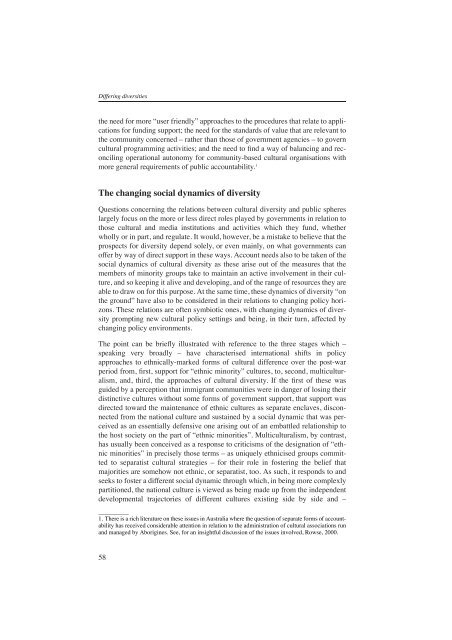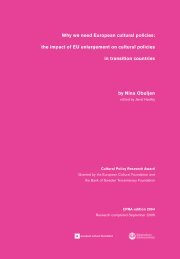<strong>Differing</strong> <strong>diversities</strong>the need for more “user friendly” approaches to the procedures that relate to applicationsfor funding support; the need for the standards <strong>of</strong> value that are relevant tothe community concerned – rather than those <strong>of</strong> government agencies – to governcultural programming activities; and the need to find a way <strong>of</strong> balancing and reconcilingoperational autonomy for community-based cultural organisations withmore general requirements <strong>of</strong> public accountability. 1The changing social dynamics <strong>of</strong> diversityQuestions concerning the relations between cultural diversity and public sphereslargely focus on the more or less direct roles played by governments in relation tothose cultural and media institutions and activities which they fund, whetherwholly or in part, and regulate. It would, however, be a mistake to believe that theprospects for diversity depend solely, or even mainly, on what governments can<strong>of</strong>fer by way <strong>of</strong> direct support in these ways. Account needs also to be taken <strong>of</strong> thesocial dynamics <strong>of</strong> cultural diversity as these arise out <strong>of</strong> the measures that themembers <strong>of</strong> minority groups take to maintain an active involvement in their culture,and so keeping it alive and developing, and <strong>of</strong> the range <strong>of</strong> resources they areable to draw on for this purpose. At the same time, these dynamics <strong>of</strong> diversity “onthe ground” have also to be considered in their relations to changing policy horizons.These relations are <strong>of</strong>ten symbiotic ones, with changing dynamics <strong>of</strong> diversityprompting new cultural policy settings and being, in their turn, affected bychanging policy environments.The point can be briefly illustrated with reference to the three stages which –speaking very broadly – have characterised international shifts in policyapproaches to ethnically-marked forms <strong>of</strong> cultural difference over the post-warperiod from, first, support for “ethnic minority” cultures, to, second, multiculturalism,and, third, the approaches <strong>of</strong> cultural diversity. If the first <strong>of</strong> these wasguided by a perception that immigrant communities were in danger <strong>of</strong> losing theirdistinctive cultures without some forms <strong>of</strong> government support, that support wasdirected toward the maintenance <strong>of</strong> ethnic cultures as separate enclaves, disconnectedfrom the national culture and sustained by a social dynamic that was perceivedas an essentially defensive one arising out <strong>of</strong> an embattled relationship tothe host society on the part <strong>of</strong> “ethnic minorities”. Multiculturalism, by contrast,has usually been conceived as a response to criticisms <strong>of</strong> the designation <strong>of</strong> “ethnicminorities” in precisely those terms – as uniquely ethnicised groups committedto separatist cultural strategies – for their role in fostering the belief thatmajorities are somehow not ethnic, or separatist, too. As such, it responds to andseeks to foster a different social dynamic through which, in being more complexlypartitioned, the national culture is viewed as being made up from the independentdevelopmental trajectories <strong>of</strong> different cultures existing side by side and –__________1. There is a rich literature on these issues in Australia where the question <strong>of</strong> separate forms <strong>of</strong> accountabilityhas received considerable attention in relation to the administration <strong>of</strong> cultural associations runand managed by Aborigines. See, for an insightful discussion <strong>of</strong> the issues involved, Rowse, 2000.58
Transversal study on the theme <strong>of</strong> cultural policy and cultural diversityirrespective <strong>of</strong> their size or status in terms <strong>of</strong> histories <strong>of</strong> migration – each beingjudged, at least theoretically, as being <strong>of</strong> equal value. In the current moment <strong>of</strong> culturaldiversity, by contrast, it is the intersections and intermixings <strong>of</strong>, andcrossovers between, different cultural perspectives and traditions that produces thesocial dynamics for forms <strong>of</strong> cultural diversity that constantly interpenetrate oneanother with new and unpredictable consequences. It is this dynamic for diversitythat cultural policies – while still pursuing aspects <strong>of</strong> the earlier phases – are now,in responding to the new conceptual contexts discussed in the previous section(Culture, government and diversity: policy contexts), seeking both to accommodateand to promote.Cultural marketsHowever they are conceived, the social dynamics <strong>of</strong> diversity have to connect with– or be propelled by – market mechanisms if they are to prove sustainable. It is,moreover, through the role they play in providing the conditions in which marketsoperate that governments can enhance the social dynamics for diversity thatemerge out <strong>of</strong> the community and associational life <strong>of</strong> different cultural traditionsand the relations between them. It is arguable in these respects that the connectionsbetween cultural and economic policies bear most directly on cultural diversity.Three contemporary areas <strong>of</strong> concern illustrate the potential significance <strong>of</strong> theseconnections.The first concerns the role <strong>of</strong> “cultural entrepreneurship” in using existing marketsor developing new ones for minority arts and cultural activities. While the term isa new one, there is a long history <strong>of</strong> “cultural entrepreneurship” on the part <strong>of</strong>black artists, perhaps most successfully in the music industries. There is alsoample evidence <strong>of</strong> the respects in which such entrepreneurship can be assisted orfrustrated by the measures governments take in terms <strong>of</strong> a range <strong>of</strong> factors: localcultural industry development policies, the regulation <strong>of</strong> sound recording industries,and the regulation <strong>of</strong> playtime for different categories <strong>of</strong> music on nationalbroadcast networks, for example. 1The second concerns the significance <strong>of</strong> connections between cultural diversityand cultural tourism, especially for indigenous peoples whose economies <strong>of</strong>tendepend significantly on the strong appeal that their arts and culture have fortourists as well as for the world art market. It is true that there are many difficultieshere. The risk that cultural diversity, in these circumstances, becomes a form<strong>of</strong> “zoo multiculturalism” in which indigenous cultural production becomes tailoredto the interest in exotica which characterise the tourist gaze is real enough. 2So is the risk that most <strong>of</strong> the financial benefits will go to cultural intermediariesrather than to indigenous cultural producers and communities if intellectual propertystandards and their application are not adjusted to take account <strong>of</strong> the specific__________1. A range <strong>of</strong> relevant issues here is canvassed in the essays collected in Malm, 1992, and in <strong>Bennett</strong>et al., 1993.2. For an assessment <strong>of</strong> these issues across Australia, Canada and New Zealand, see Craik, 1994.59
- Page 5 and 6:
PrefaceThe present text constitutes
- Page 7: Part IDiffering diversities:transve
- Page 11 and 12: The study: background, contextand m
- Page 13 and 14: Transversal study on the theme of c
- Page 15: Transversal study on the theme of c
- Page 18: Differing diversitiesi. new forms o
- Page 23 and 24: IntroductionTransversal perspective
- Page 25 and 26: Transversal study on the theme of c
- Page 27 and 28: The challenge of diversityCulture,
- Page 29 and 30: Transversal study on the theme of c
- Page 31 and 32: Transversal study on the theme of c
- Page 33 and 34: Diversity, citizenship, and cultura
- Page 35 and 36: Transversal study on the theme of c
- Page 37: Transversal study on the theme of c
- Page 40 and 41: Differing diversitieslanguages. The
- Page 42 and 43: Differing diversitiesprogrammes int
- Page 45 and 46: Culture, government and diversity:p
- Page 47 and 48: Transversal study on the theme of c
- Page 49 and 50: Transversal study on the theme of c
- Page 51 and 52: Transversal study on the theme of c
- Page 53: Transversal study on the theme of c
- Page 56 and 57: Differing diversitiesin the pursuit
- Page 60 and 61: Differing diversitiescircumstances
- Page 62 and 63: Differing diversitiesclasses artist
- Page 64 and 65: Differing diversitiesMy point, then
- Page 66 and 67: Differing diversitiesiii. that the
- Page 69: Transversal study on the theme of c
- Page 73 and 74: The consequences of European media
- Page 75 and 76: Reasearch position paper 1and contr
- Page 77 and 78: Reasearch position paper 1directly
- Page 79 and 80: Reasearch position paper 1There hav
- Page 81 and 82: Reasearch position paper 1presence
- Page 83 and 84: Reasearch position paper 1Strategic
- Page 85 and 86: Reasearch position paper 1New media
- Page 87 and 88: Reasearch position paper 1Blumler,
- Page 89 and 90: Reasearch position paper 1Hoffmann-
- Page 91 and 92: Reasearch position paper 1Pauwels,
- Page 93 and 94: Assessing the implementationof cult
- Page 95 and 96: Reasearch position paper 2tics abou
- Page 97 and 98: Reasearch position paper 2Act (GPRA
- Page 99 and 100: Reasearch position paper 2factually
- Page 101 and 102: Reasearch position paper 2The evalu
- Page 103 and 104: Reasearch position paper 2capacity
- Page 105 and 106: Reasearch position paper 2Luchtenbe
- Page 107 and 108: The cultural policies of the Europe
- Page 109 and 110:
Reasearch position paper 3went, wou
- Page 111 and 112:
Reasearch position paper 3The histo
- Page 113 and 114:
Reasearch position paper 3integrati
- Page 115 and 116:
Reasearch position paper 3of differ
- Page 117 and 118:
Reasearch position paper 3European
- Page 119 and 120:
Reasearch position paper 3voice to
- Page 121:
Reasearch position paper 3Howe, Mar
- Page 124 and 125:
Differing diversitiesContemporary d
- Page 126 and 127:
Differing diversitiesWhereas in the
- Page 128 and 129:
Differing diversitiesbuilding on th
- Page 130 and 131:
Differing diversitieswhen tackling
- Page 132 and 133:
Differing diversitiesand that is pr
- Page 134 and 135:
Differing diversitiesSennett, Richa
- Page 136 and 137:
Differing diversitiesallowing their
- Page 138 and 139:
Differing diversitiesNevertheless,
- Page 140 and 141:
Differing diversitiesgrowth also ex
- Page 142 and 143:
Differing diversitiesAt a deeper le
- Page 144 and 145:
Differing diversitiesconventional c
- Page 146 and 147:
Differing diversitiesworks, and the
- Page 148 and 149:
Differing diversitiesNational sover
- Page 150 and 151:
Differing diversitiesSimilarly, at
- Page 152 and 153:
Differing diversitiesCoombe, Rosema
- Page 154 and 155:
Differing diversitiesWoodmansee, Ma
- Page 156 and 157:
Differing diversitiesIndeed, which
- Page 158 and 159:
Differing diversitiesThe second maj
- Page 160 and 161:
Differing diversitiesexample by Hol
- Page 162 and 163:
Differing diversitiesincreased broa
- Page 164 and 165:
Differing diversities“Black Carib
- Page 166 and 167:
Differing diversitiesBunt, Gary, 19
- Page 169 and 170:
Preserving cultural diversity throu
- Page 171 and 172:
Reasearch position paper 7unique, t
- Page 173 and 174:
Reasearch position paper 7legislati
- Page 175 and 176:
Reasearch position paper 7appropria
- Page 177 and 178:
Reasearch position paper 7Indeed, m
- Page 179 and 180:
Reasearch position paper 7- means t
- Page 181 and 182:
Reasearch position paper 7cyberspac
- Page 183 and 184:
Reasearch position paper 7extended
- Page 185 and 186:
Reasearch position paper 7It is rec
- Page 187 and 188:
Reasearch position paper 7lose loca
- Page 189 and 190:
Reasearch position paper 7six proje
- Page 191 and 192:
Reasearch position paper 7and innov
- Page 193 and 194:
Reasearch position paper 7Programme
- Page 195 and 196:
Reasearch position paper 7Reference
- Page 197 and 198:
Reasearch position paper 7Papers on
- Page 199:
Reasearch position paper 7Swaminath
- Page 202:
Sales agents for publications of th














